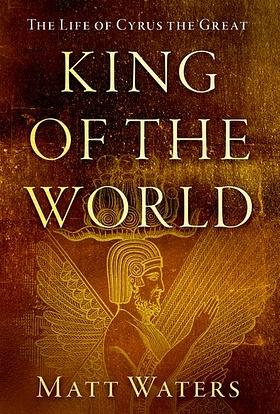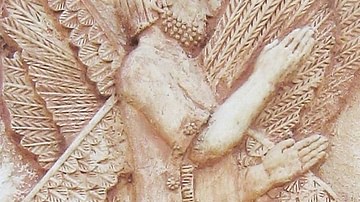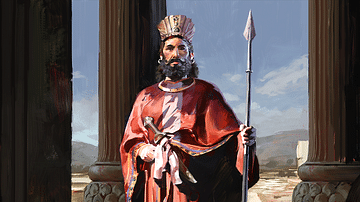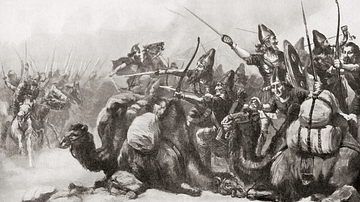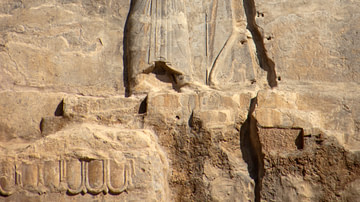In this interview, World History Encyclopedia sits down with author Matt Waters to chat about his new book King of the World: The Life of Cyrus the Great published by Oxford University Press.
Kelly: Can you tell us a bit about your book?
Matt: This book explores the life of Cyrus the Great, the founder of the Achaemenid Persian Empire, reigned from 559 to 530 BCE, a man about whom surprisingly little has been written despite his impact on world history. Prominent among his royal titles was “King of the World,” an epithet that with Cyrus, for the first time, approximated a literal reality, at least as applied to the known world at that time: the widely diverse populations of Iran, Greater Mesopotamia, Anatolia, and the Levant. This was unprecedented. Cyrus united under one rule, for the first time, an area at least quadruple the size of any previous empire. Within two decades after his death, his successors added Egypt, parts of the Balkans, and the Indus Valley, a sprawling empire seldom rivaled in its expanse of territory and its staying power. This book examines Cyrus’ life and career, the milieu in which he lived and the influences upon him, as well as his legacy. More than a simple narrative of what Cyrus accomplished, it is an assessment of a broad range of documentary, archaeological, and art historical evidence, as well as their manifold problems of interpretation.

Kelly: Why did you choose to write a book on Cyrus the Great?
Matt: In historical treatments of this period, c.550-330 BCE, the first Persian Empire often plays second fiddle to the glory that was Classical Greece, because of the latter’s profound influence on the western tradition. This book intends to throw into sharper relief how Cyrus managed to assemble and rule the world’s first hyperpower and, by extension, how it influenced both contemporaries, including the Greeks, and subsequent periods. Cyrus the Great is one of the most pivotal, yet underappreciated, figures in history, and he deserves more air-time. He may be matched with any of history’s outsized personalities, such as Alexander the Great, Julius Caesar, or Chinggis Khan, though books dedicated to Cyrus are far fewer in number. Source availability and access, or lack thereof, are main reasons for this. We’ve come a long way in the last few decades, but there is still a long way to go. This book aims to make a contribution on that path.
Kelly: Can you tell us a bit about the lead up to the Achaemenid Persian Empire and the reign of Cyrus the Great? How did Cyrus end up as the ruler of such an Empire?
Matt: That indeed is the crux of the matter, how did Cyrus do it? The Assyrians were the dominant power in the ancient Near East and eastern Mediterranean from roughly 900 to 600 BCE. Shortly after the sack of Nineveh in 612, the Assyrians were no longer a force with which to be reckoned, and the eastern Mediterranean became multipolar. This included, of course, the Persians, but who were relative unknowns before Cyrus took the world by storm starting in 550. Much of Iran was unified by conquest and, it appears, diplomatic marriages. In short order, over slightly more than a decade, Cyrus conquered the three major powers of the time: the Medes in northern Iran, the Lydian kingdom that ruled much of Anatolia and parts of the Greek world, and the Babylonian Empire, the last the main successors to the Assyrians. Cyrus united the disparate regions from the Aegean Sea to Central Asia under one rule for the first time. The rest, as the cliché runs, is history.
Kelly: What are the kinds of primary evidence and texts you have available to you about Cyrus? Did you come across any problems when working with the ancient materials?
Matt: Cyrus left his imprint in his new capital, which was only finished by his successors, of Pasargadae in modern Fars; its design and construction tell us a lot about Cyrus, especially with regard to the importance of gardens and parks to the Persians. The ancient Persian kings themselves recorded royal inscriptions primarily in the three languages of the empire’s core: Old Persian, Elamite, and Babylonian; for Cyrus and his reign we have several inscriptions that have survived from Babylonia. In addition, texts written in Elamite, Babylonian, and also Aramaic provide all sorts of information on the administration of the empire. Judean and especially Greek sources are useful (indeed, necessary) to reconstruct the narrative history of Cyrus and his successors. But this poses one of the critical problems with the study of this period: the surviving evidence for narrative history is rich but sporadic, and often written by outsiders – a good perspective but not always easily balanced by surviving material from the core of the empire itself.
Kelly: You mentioned that your book includes the influences upon Cyrus, what kind of influences were they?
Matt: There were multiple inputs. Cyrus conquered a lot of territory, which provided access to influences beyond Iran. The ancient Persians were masters of adopting and adapting the best parts of various traditions with their own to make something unique to that point in history. Achaemenid royal ideology, initiated of course by Cyrus, took many cues from the Assyrians a century previous, combined with Iranian traditions. Cyrus’ administrative apparatus was adapted from Assyrian, Elamite, and Babylonian systems. Architectural refinements and techniques, such as Cyrus’ new capital of Pasargadae, borrowed from the whole lot and included eastern Iranian, Judean, Anatolian and Greek, and even Egyptian contributions or influences. It was truly the first world empire.
Kelly: What did you find most interesting while researching and writing the book?
Matt: Cyrus the Great was well-regarded in the surviving records of all those peoples whom he conquered and ruled: a surprising but compelling phenomenon. Surviving accounts from multiple traditions testify to his ingenuity, acumen, magnanimity, and the force of his personality; he was considered a father-figure by many of these peoples, not just the Persians. This phenomenon runs counter with almost all of Cyrus’ successors. especially Xerxes, who were often vilified in Greek, Babylonian, and Judaic sources: fairly or not (probably the latter). The portrayals of later Persian monarchs offer a marked contrast from those of Cyrus.
Kelly: What do you think people should really know about the subject?
Matt: Cyrus the Great and the Achaemenid Persian Empire are often overlooked in modern histories, overshadowed by the contemporary late Archaic and Classical periods of Ancient Greece, and the Second Temple period of Judean history. However, the Persian Empire was far and away the dominant geopolitical power of its time, and it exerted its own influence on both these traditions, and others. As the Empire’s founder, Cyrus was a key figure in its developments. The study of Cyrus and the early Persians is an essential component of understanding Middle Eastern in its own right, as well as the Greek and Biblical traditions.
Kelly: Thankyou so much for answering our questions, and diving into the life and achievements of Cyrus the Great!

